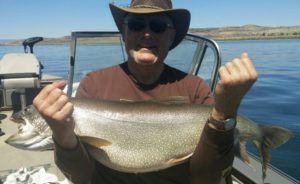Journeys to Humanism: God Kid Becomes a Happy Humanist
Journeys to Humanism, theHumanist.com’s regular series, features real stories from humanists in our community. From heartwarming narratives of growth, to more difficult journeys, our readers open up about their experiences coming to humanism.
Marty Shoemaker
Vancouver, BC, Canada
 I am now volunteering as a Humanist Chaplain in Canada, but my journey toward this encore career started in a very different space. I was born and raised in California in a very religious, evangelical church that planted in me two conflicting thought processes. On one hand, I was taught the standard Christian belief system based on the Bible and told not to question dogma that didn’t make sense because “god works in mysterious ways.” On the other hand, my church was a large university-related congregation that had many faculty and academics who often spoke of “thinking” about one’s beliefs using rational skills.
I am now volunteering as a Humanist Chaplain in Canada, but my journey toward this encore career started in a very different space. I was born and raised in California in a very religious, evangelical church that planted in me two conflicting thought processes. On one hand, I was taught the standard Christian belief system based on the Bible and told not to question dogma that didn’t make sense because “god works in mysterious ways.” On the other hand, my church was a large university-related congregation that had many faculty and academics who often spoke of “thinking” about one’s beliefs using rational skills.
Initially, these two streams of developing one’s choices seemed to converge and not be in conflict. But when I began to explore and develop close relationships with liberal religious friends and non-believers, they clashed. Key challenges began to appear in this faith system when I worked with atheist and agnostic scientists in an astronaut training program after university. Also, a year teaching in Harlem in New York City exposed me to suffering and injustice about which my version of Christianity had few answers.
Things came to a head when I chose to go to graduate school for Clinical Psychology at Fuller Seminary, a bastion for evangelical scholarship. We were required to study both theology and secular psychology/social science methods. They wanted these two areas of study to be integrated, but for many of us it fragmented our faith. Learning why we do what we do based on genetics and early childhood conditioning led me to seek therapy and gain more objectivity about my beliefs. These cracks were ironically augmented by biblical criticism classes which exposed the “inerrant” King James Bible as an “approximation” of the revelation of God transmitted to us in oral form then translated to written books. So, what can I trust in these early narratives which were showing real error and human tampering for human ends? Other students were also experiencing doubt and skepticism, which was a tremendous support in the face of family and friend’s rejection and censure. The “thinking” side of my early training had come to take precedence over the “faith” side.
At age twenty-five I went into the chapel at Fuller and sat, crying out to a god that seemed to be silent. I put out my fleece of Joshua as a sign to verify that a deity will respond and confirm existence. After two hours in silence, wishing for a sign, nothing happened except a sore bottom and dehydration. I walked out of the chapel never to return. I left the church behind and moved into secular science, working on my biases to become more transparent and not afraid of questioning all beliefs that were rolling around in my head. I finished my PhD in Clinical Psychology and never looked back except to acknowledge the many humanistic values I had been taught as a child, even within a religious context. These included service to others, limiting my need to get what I wanted, and compassion for others.
After marriage and raising two wonderful children in Canada, around thirty years ago I attended a meeting at a University of British Columbia faculty friend’s home, an informal meeting of local humanists. They were talking about humanism in Canada and putting together a chapter as a type of community for like-minded secular friends. I inquired about what humanism really stood for, as in my world humanism was associated with Renaissance scholarship. A list of beliefs was given to me as the three versions of Humanist Manifestos of the AHA. Really, people exist who believe in science, evidence, compassionate service, social justice and separation of religion from government pressure. Really? COUNT ME IN…
I began reading more about this worldview and their communities around the world. I began to identify in meetings with friends and fellow professionals as a “humanist” to frequent blank stares and frowns. “What’s that?” became a Q&A so frequent that my reading and discussions became as regular as my love for football and hockey.
All of this led me to join the British Columbia Humanist Association in 2009, and later their board. As a university instructor and clinician, I received offers to lecture to students and fifty-five plus classes began to come my way. I had lit a flame of an alternative to religious commitment that had an eager audience in our secular society here in Western Canada. It culminated in volunteering the last eight years as a humanist chaplain which now my organizing principle. God kid becomes a Happy Humanist.
We all have our own stories of how we came to be humanists, and we want to hear yours! Fill out the form here to be featured in this series.
